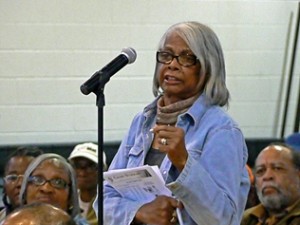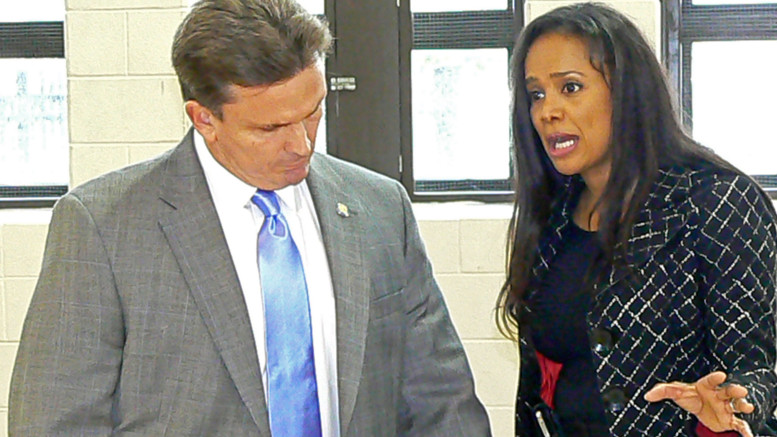by La Risa Lynch
Bringing in the National Guard to curb violence plaguing city neighborhoods dominated a Seventh Ward public safety meeting last week where Chicago Police Superintendent Jody Weis insisted that police are better able to handle violence than the military.
“The National Guard is the solution if you are willing to give up your first, fourth, fifth and six amendments,” Weis told more than 100 residents who packed Rainbow Beach Park field house.
“If you are willing to give up your right to assembly on a corner and have free speech then the National Guard is the solution,” he added.
Law enforcement’s mission is different from the military, Weis explained, adding that police’s goal “is a successful prosecution.”
“That is not their mission,” said Weis who served in the U.S. Army. He cited the shooting deaths of four Kent State University students killed by the National Guard in 1970 as reason for not using the National Guard.
“I don’t know if you want 18-year-old men and women driving in Humvees with fully automatic M-16s, not knowing the streets of Chicago … maybe thinking they hear a shot, maybe seeing a group of four or five guys on the corner where they think the shot come from and they go out and shot all four or five guys.”
Weis said he understands residents’ frustration, but sensationalized headlines in April stirred calls for the National Guard. But Weis added that overall violent crime in the city is down 11 percent and murders are down 40 percent in the Seventh Ward.
To combat a wave of violence associated with summer heat, Weis noted more manpower will be deployed in the 9 percent of city blocks notorious for the city’s high crime numbers. That same real estate was responsible for the bulk of crime in 2008 and 2007, he added.

South Shore resident Pearl Fountain wants the National Guard to assist the police because she says too many kids are being killed.
The department, he explained, is doing more pinpointed deployment of resources in places before crime is committed. The key to curbing violence, Weis contends, is a strong relationship between police and community. He stressed the importance of attending beat meetings and organizing block clubs.
Yet, the biggest challenge to police is the code of silence on the streets. The no snitching rule perpetuates the cycle of violence, Weis said, adding that not snitching benefits the offender who is free to hurt more people.
“Today’s offenders becomestomorrow victims,” he said, adding that most offenders live in the community. “They weren’t coming from the suburbs and shooting people.”
However, South Shore resident Pearl Fountain wants the National Guards.
“Police men, I think you are doing a good job, but I think you need some help,” Fountain said. “I’m 80 years old, and I never (seen) so many kids getting killed.”
Her granddaughter, she added, lives three blocks from school and her parents pick-up her up every day because “they are afraid to let (her) walk back and forth.”
Another South Shore resident, who declined to give her name, agreed with Weis. The resident recalled how her relatives were treated by the National Guard after Hurricane Katrina devastated New Orleans.
“They treated those people like they were enemies,” she said. “They are train to do war. They are not train to serve and protect normal citizens.”
Ald. Sandi Jackson also is against using the National Guard. She said they are not suited to handle the city’s particular issues. The Black community needs more jobs, because crimes like burglaries are economically driven so individuals can support their families, Jackson explained.
“I don’t want to turn our community into a militarized zone,” she said.
Also discussed at the meeting was the use of the police department’s blue light camera system. Since 2006, more than 4,000 arrest were made from the camera. Weis said the department is looking at technology to expand camera use, including hidden or covert cameras. He said the police also has the infrastructure to tap into a business’s private security camera to put additional eyes on the streets.
The cameras also have been successful in tracking non-criminal activity. He cited the death of former Chicago Board of Education President Michael Scott as example. The cameras enabled police to see Scott was alone in his final hours.
“It gave us further indication that it was a suicide rather than any type of foul play,” Weis noted.
Jackson favors the use of covert cameras and even offered up her entire ward as a pilot project for their installation. Placing covert cameras throughout the ward makes it impossible for criminals to know where the cameras are, she said.
“I like what I see in London. I have no problems with big brother looking at every single camera,” Jackson added.

Be the first to comment on "Weis: Stronger community ties with police, not National Guard can deter crime"